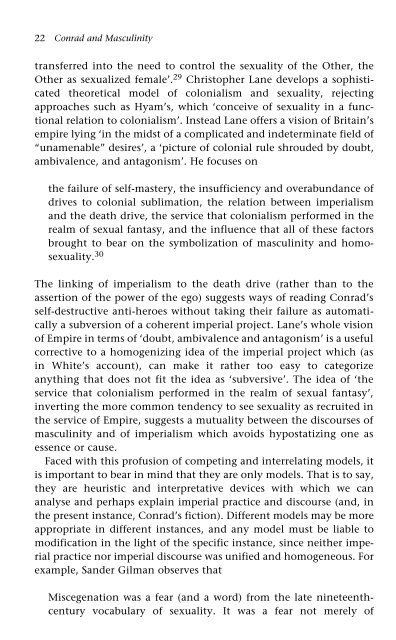Conrad and Masculinity
Conrad and Masculinity
Conrad and Masculinity
You also want an ePaper? Increase the reach of your titles
YUMPU automatically turns print PDFs into web optimized ePapers that Google loves.
22 <strong>Conrad</strong> <strong>and</strong> <strong>Masculinity</strong><br />
transferred into the need to control the sexuality of the Other, the<br />
Other as sexualized female’. 29 Christopher Lane develops a sophisticated<br />
theoretical model of colonialism <strong>and</strong> sexuality, rejecting<br />
approaches such as Hyam’s, which ‘conceive of sexuality in a functional<br />
relation to colonialism’. Instead Lane offers a vision of Britain’s<br />
empire lying ‘in the midst of a complicated <strong>and</strong> indeterminate field of<br />
“unamenable” desires’, a ‘picture of colonial rule shrouded by doubt,<br />
ambivalence, <strong>and</strong> antagonism’. He focuses on<br />
the failure of self-mastery, the insufficiency <strong>and</strong> overabundance of<br />
drives to colonial sublimation, the relation between imperialism<br />
<strong>and</strong> the death drive, the service that colonialism performed in the<br />
realm of sexual fantasy, <strong>and</strong> the influence that all of these factors<br />
brought to bear on the symbolization of masculinity <strong>and</strong> homosexuality.<br />
30<br />
The linking of imperialism to the death drive (rather than to the<br />
assertion of the power of the ego) suggests ways of reading <strong>Conrad</strong>’s<br />
self-destructive anti-heroes without taking their failure as automatically<br />
a subversion of a coherent imperial project. Lane’s whole vision<br />
of Empire in terms of ‘doubt, ambivalence <strong>and</strong> antagonism’ is a useful<br />
corrective to a homogenizing idea of the imperial project which (as<br />
in White’s account), can make it rather too easy to categorize<br />
anything that does not fit the idea as ‘subversive’. The idea of ‘the<br />
service that colonialism performed in the realm of sexual fantasy’,<br />
inverting the more common tendency to see sexuality as recruited in<br />
the service of Empire, suggests a mutuality between the discourses of<br />
masculinity <strong>and</strong> of imperialism which avoids hypostatizing one as<br />
essence or cause.<br />
Faced with this profusion of competing <strong>and</strong> interrelating models, it<br />
is important to bear in mind that they are only models. That is to say,<br />
they are heuristic <strong>and</strong> interpretative devices with which we can<br />
analyse <strong>and</strong> perhaps explain imperial practice <strong>and</strong> discourse (<strong>and</strong>, in<br />
the present instance, <strong>Conrad</strong>’s fiction). Different models may be more<br />
appropriate in different instances, <strong>and</strong> any model must be liable to<br />
modification in the light of the specific instance, since neither imperial<br />
practice nor imperial discourse was unified <strong>and</strong> homogeneous. For<br />
example, S<strong>and</strong>er Gilman observes that<br />
Miscegenation was a fear (<strong>and</strong> a word) from the late nineteenthcentury<br />
vocabulary of sexuality. It was a fear not merely of




